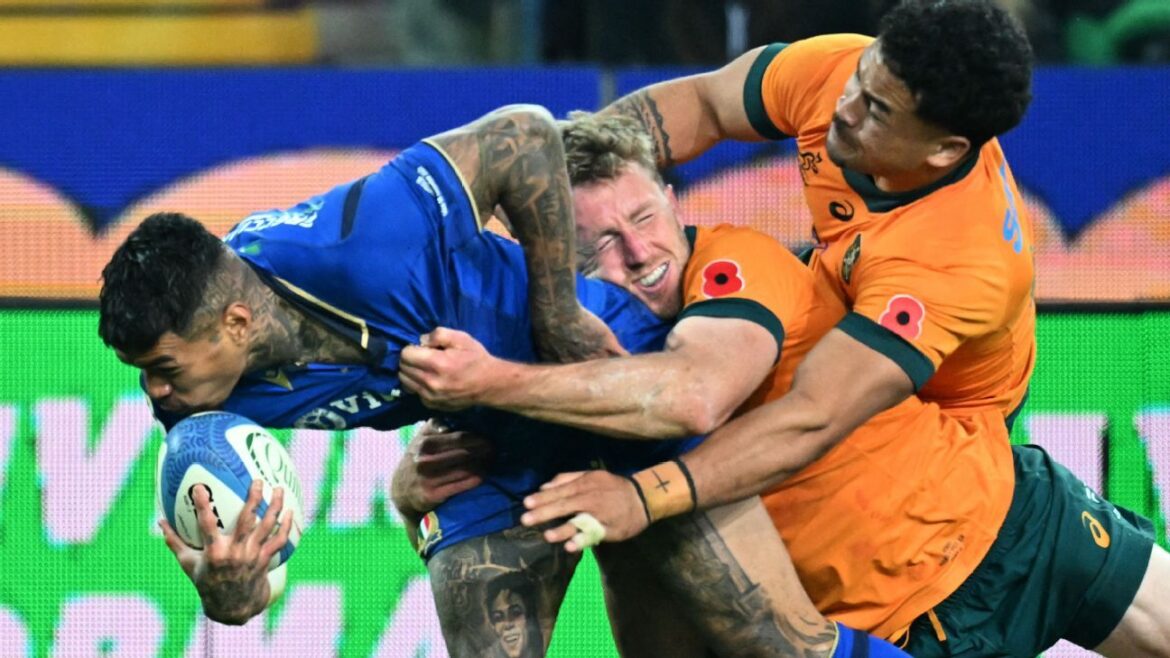The Wallabies will launch their inaugural Nations Championship campaign against Ireland, the team that thrashed them 46-19 in Dublin on Saturday, their sixth loss in seven matches.
They will have plenty of time to prepare with the event being launched in July 2026, but barring a change of plan by Rugby Australia will still be under the command of Joe Schmidt, with Reds head coach Les Kiss not due to take over until the end of that month.
Schmidt will thus also oversee fixtures against France – who the Wallabies play this weekend, and Italy, who beat them earlier this month.
Despite the coach’s poor results since the Wallabies stunned South Africa in South Africa in August, which has seen the Wallabies win just two from eight fixtures, Rugby Australia CEO Phil Waugh has shot down any talks of a potential early handover to Kiss.
“I’ve had no indication otherwise,” Waugh told Sydney Morning Herald.
“We’re conscious of the work and external pressures and we need to ensure that we put the right support around him and I think we’re doing that.
“We’ll continue to do that to ensure that we continue that level of continuity and consistency within that environment, with Joe taking us through to the end of the Nations Championship at the end of July.
“We’re very confident with the strategy we have in place, confident with the integration into a new coach after the Nations Championship.”
In November 2026 Australia will undertake what is in effect another ‘Autumn Internationals’ tour, visiting England, Scotland and Wales, but with the added competitive edge of being part of the Nations Championship.
They will then have played all six sides billed as “northern hemisphere”, as will have the other five “southern hemisphere” nations involved (New Zealand, South Africa, Argentina, Fiji, Japan – the latter designated “southern hemisphere” despite geographically being north of the equator).
North and South will be ranked in separate tables, with each team facing their equivalent in Finals Weekend at Twickenham at the end of November. The results will count towards a North v South score, besides determining a global champion.
The new competition, to be played biennially in years without a World Cup or British and Irish Lions tour, will provide a context to the many Test matches between teams from the northern and southern hemispheres in the existing July and November windows.
More importantly, it is expected to bring in millions of dollars in ticket sale, sponsorship and media rights, providing a shot in the arm for the sport and helping the establishment combat the threat of the rebel R360 event.
Tom Harrison, CEO of Six Nations Rugby, said the competition marks a “tectonic shift in the sport” and “has the power to redefine the future of rugby.”
“Rugby’s strongest nations have collaborated,” Harrison said, “with a clear vision to grow the game, by challenging traditional ways of operating to create a tournament structure with genuine global relevance, which will unlock the true value of the sport.”
In recognition of the logistical challenges – and greater revenue opportunities elsewhere – Fiji are set to play their home matches elsewhere with the BBC reporting they will meet England in South Africa and Wales and Scotland in the United Kingdom.
To accommodate the event, and the recently announced Test series between the All Blacks and the Springboks next year, the Rugby Championship will not be played in 2026.
Besides the Nations Championship fixture release a second-tier competition, the Nations Cup, was also announced by World Rugby on Monday.
That will again feature 12 teams and be played concurrently. There is no immediate prospect of promotion and relegation between the tiers.
Already qualified for the Nations Cup are Canada, Chile, Georgia, Hong Kong, Portugal, Romania, Spain, Tonga, Uruguay, USA and Zimbabwe with the 12th team set to be Belgium or Samoa.
